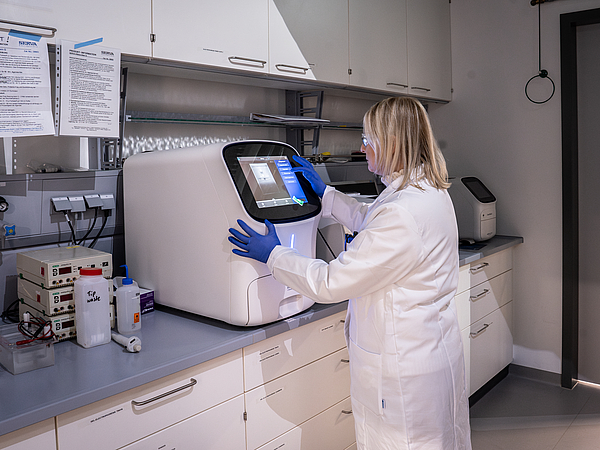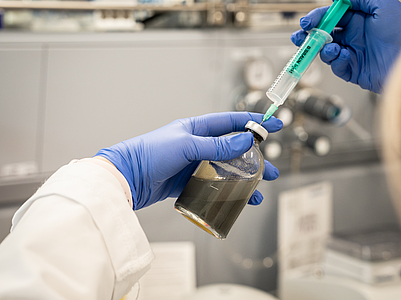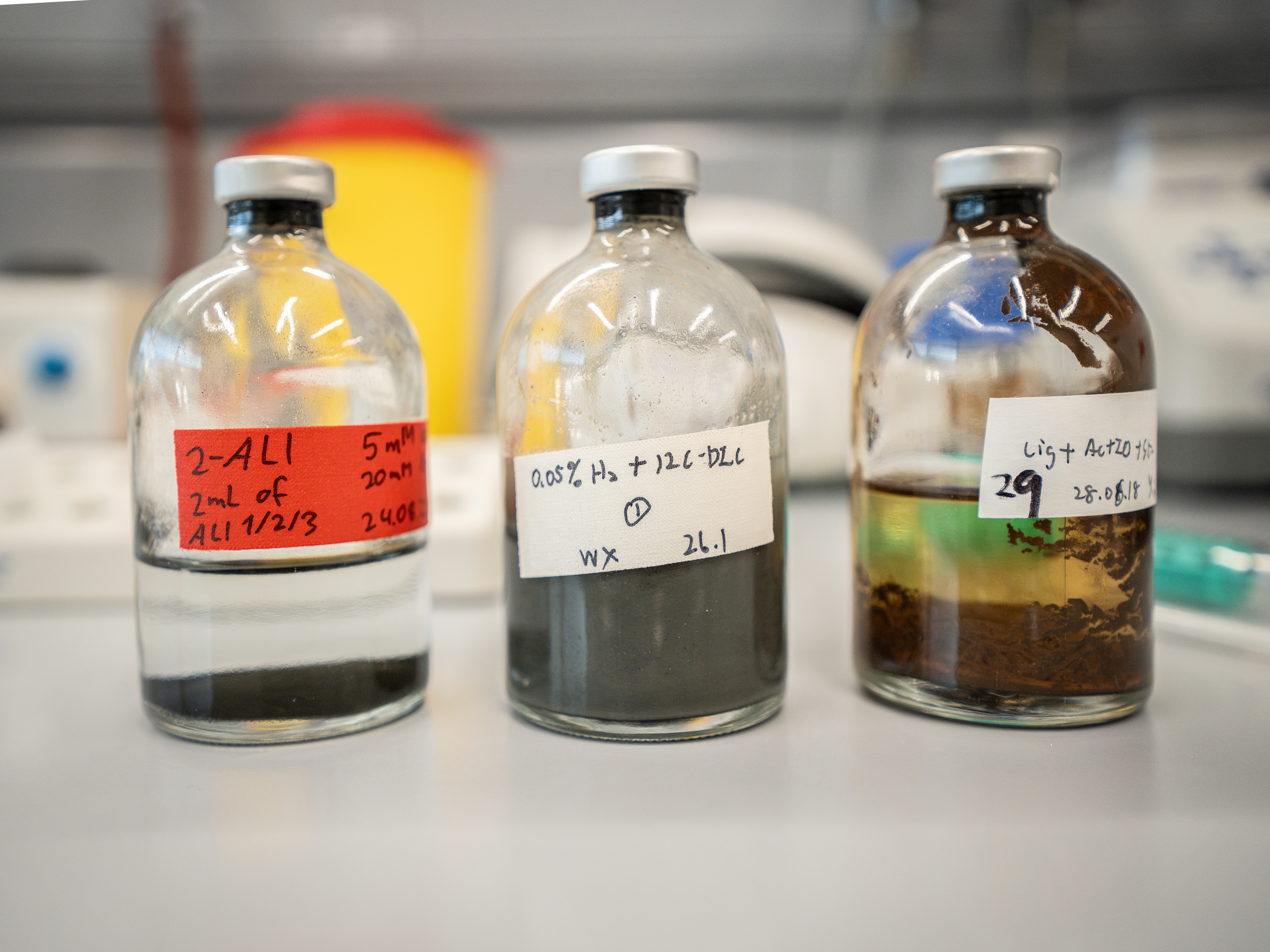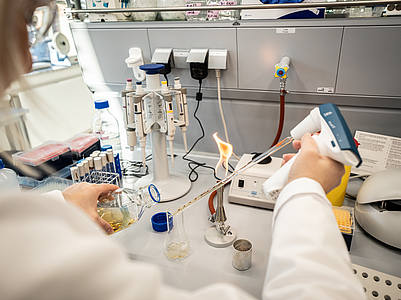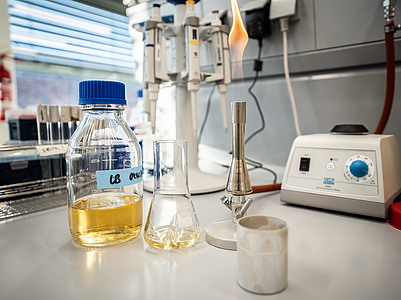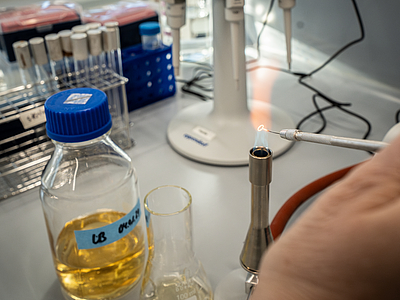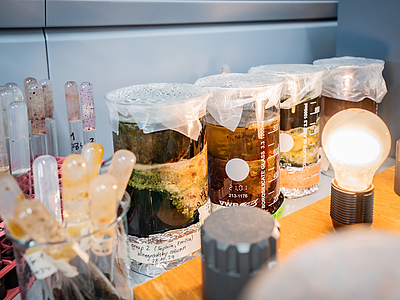Microbial Ecophysiology
The Microbial Ecophysiology group at the University of Bremen is part of the Bremen Marine Ecology Centre for Research & Education (BreMarE) and is associated with MARUM, Center for Marine Environmental Sciences. Our main research interests are anaerobic microbial processes in marine sediments, and the functional biodiversity of microorganisms involved.
News
March, 2025: Dr. Mara Maeka has successfully completed her doctoral studies. Congratulations!
February, 2025: Dr. Lea Wunder has successfully completed her doctoral studies. Congratulations!
August, 2024: Dr. Karen Krüger started her postdoc position - welcome!
June, 2024: Microorganisms and Biogeochemical Cycles - How does water from glacier retreat impact
marine life? Dr. Willis Poratti leads a biogeochemistry project that studies the cycles of
elements such as sulfur, iron, and carbon. From this, she examines how glacier retreat,
nutrient overload, marine sediments, and associated organisms are affected.
New publications
Aromokeye D A, Willis-Poratti G, Wunder L, Yin Y, Richter-Heitmann T, Otersen C, Maeke M, Henkel S, Neder C, Vázquez S, Elvert M, Mac Cormack W, Friedrich MW (2024) Global warming facilitated environmental change effects on CO2 releasing microbes in Antarctic sediments. Research Square
Maeke M, Yin X, Wunder L, Vanni C. Richter-Heitmann T, Miravet-Verde T S, Ruscheweyh H-J, Sunagawa S, Fabian J, Piontek J, Friedrich MW, Hassenrück C (2024) Extensive data mining uncovers novel diversity among members of the rare biosphere within the Thermoplasmatota. Research Square
Wunder L, Breuer I, Willis-Poratti G, Adeyemi Aromokeye D, Henkel S, Richter-Heitmann T, Yin X, Friedrich MW (2024) Manganese reduction and associated microbial communities in Antarctic surface sediments.Frontiers Vol. 15
Zhu Q, Yin X, Taubner H, Wendt J, Friedrich MW, Elvert M, Hinrichs K-U, Middeburg J et al. (2024) Secondary production and priming reshape the organic matter composition in marine sediments.Science Advances Vol 10, Issue 20
Yin X, Zhou G, Cai M, Richter-Heitmann T, Zhu Q, Maeke M, Kulkarni A, Nimzyk R, Elvert M, Friedrich MW (2024) Physiological versatility of ANME-1 and Bathyarchaeotoa-8 archaea evidenced by inverse stable isotope labeling. Microbiome 12: 68
Gande D, Hassenrück C, Zure M, Richter-Heitmann T, Willerslev E, Friedrich MW (2024) Recovering short DNA fragments from minerals and marine sediments: A comparative study evaluating lysis and isolation approaches. Environmental DNA 6(2)
Wang G, Feng Z, Yin X (2024) Biogenic manganese oxides promote metal(loid) remediation by shaping microbial communities in biological aqua crust. Water Research 253: 121287
Yin X, Zhou G, Wang H, Han D, Maeke M, Richter-Heitmann T, Aromokeye D, Zhu Q, Nimzyk R, Elvert M, Friedrich MW (2023) Unexpected carbon utilization activity of sulfate-reducing microorganisms in temperate and permanently cold marine sediments. ISME J 18(1)
Clark MS, Hoffman, JI, Peck LS, Bargelloni L, Gande D..... Friedrich MW, ....et al. (2023) Multi-omics for studying and understanding polar life. Nat Commun 14, 7451
Yang Y, Rivera Pérez CA, Richter-Heitmann T, Nimzyk R, Friedrich MW et al. (2023) Effects of oxygen availability on mycobenthic communities of marine coastal sediments. Sci Rep 13, 15218
Han D, Richter-Heitmann T, Kim J-H, Friedrich MW, Yin X, Elvert M, Ryu J-S, Jang K and Nam S-I (2023) Influence of sedimentary deposition on the microbial assembly process in Arctic Holocene marine sediments. Front. Microbiol. 14:1231839.
Zhang, Fang, Yin X et al. (2023) Fermentation metabolism dominates in the gas-hydrate-rich sediments of the deep subseafloor. Research Square
Zhang, Fang, Yin X et al. (2023) The majority of microorganisms in gas hydrate-bearing subseafloor sediments ferment macromolecules. Microbiome 11, 37
Xiao X, Luo M, Zhang C, Zhang T, Yin X. et al. (2023) Metal-Driven Anaerobic Oxidation of Methane as an Important Methane Sink in Methanic Cold Seep Sediments. Microbiology Spectrum 11, 2 (2023)


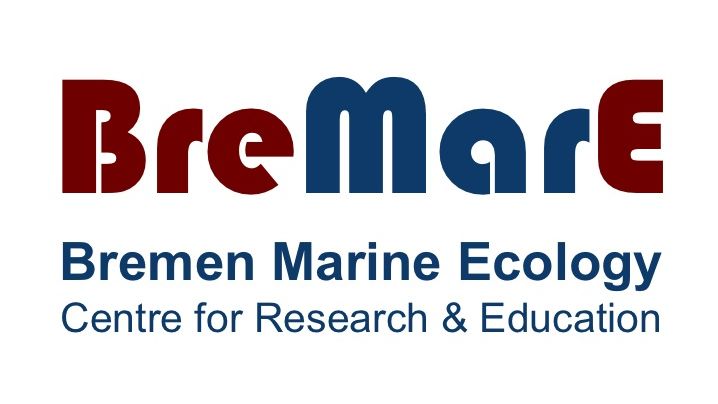
Contact
UNIVERSITÄT BREMEN
Prof. Dr. Michael W. Friedrich
Mikrobielle Ökophysiologie
Fachbereich 2 • Biologie/Chemie
James-Watt-Straße 1
BIOM, room 2550
D-28359 Bremen / Germany
Phone: +49(0)421 218 63 060
Email: michael.friedrichatuni-bremen.de
Secretariat:
UNIVERSITÄT BREMEN
Sabine Limberg
James-Watt-Straße 1
BIOM, room 2540
D-28359 Bremen / Germany
Phone: +49(0)421 218 63 061
Email: slimbergprotect me ?!uni-bremenprotect me ?!.de

